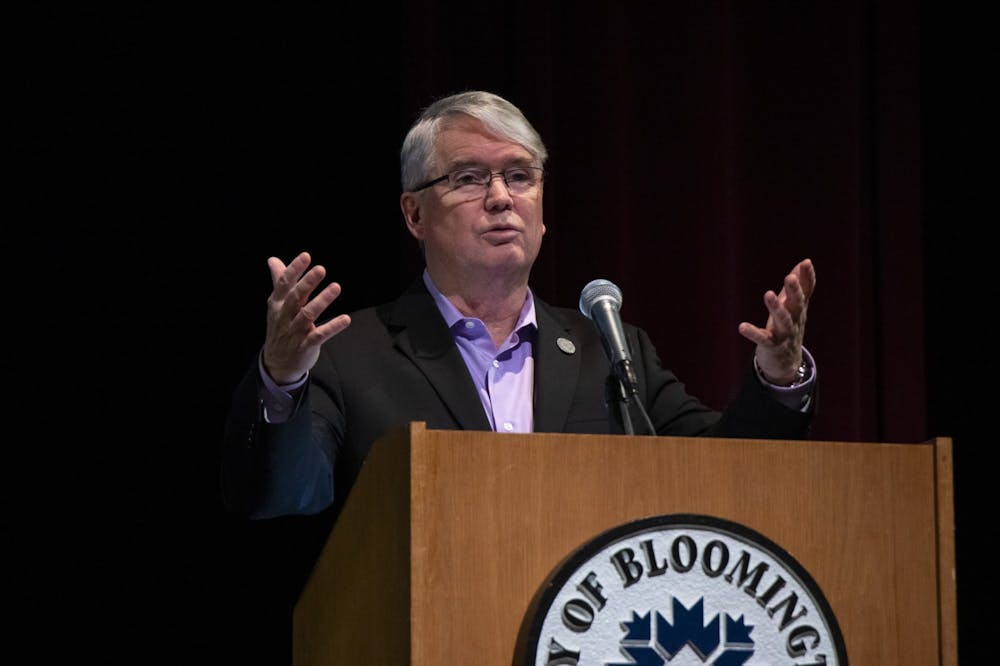Despite pleas from committee members for constructive public discussion, some Bloomington and county residents criticized Mayor John Hamilton’s proposed income tax increase to create a sustainability investment fund at a Wednesday evening Bloomington Climate Action and Resilience Committee meeting.
Bloomington and county residents spoke with the committee about the proposed 0.5% tax income increase. The money raised from the tax would go toward a sustainability investment fund for the city and county to combat climate change, committee member Matt Flaherty said.
It is a flat-rate tax, meaning everyone would be taxed equally, as opposed to a progressive income tax, which increases the tax based on the taxable income. The county income tax rate would increase 0.5%, rising from 1.345% to 1.845%. It would generate $16 million in one year, which would be divided between the county and Bloomington. For someone making $40,000 per year, the new tax would create a $200 increase from their current income tax.
All committee members said they were concerned about how the tax would affect low-income people and said the benefits created through the fund need to be skewed toward them because they will feel the effects of climate change the most.
“The goal of the fund is protecting our most vulnerable citizens and our future,” Flaherty said.
Flaherty pointed out that the amount the tax would increase and when the increase begins could still change, as the proposal is still in its early stages.
Any increase in the county income tax would need to be approved by the Monroe County Local Income Tax Council. The governing body is made up of the Bloomington City Council, Monroe County Council, Ellettsville Town Council and Stinesville Town Council. The amount of votes each body gets is decided by population, with Bloomington having about 60% of the votes.
Bloomington resident and former Tippecanoe County Councilor Ilana Stonebraker said she’s against the tax as it has been proposed. She said there aren’t enough specifics to win her support.
She said the tax should be used for specific projects and non-recurring costs so the funds can be diverted toward several projects over time. Making the tax adaptable would also help if a recession occurs, so the city can change where it allocate money.
Stonebraker said she hopes the city looks at this fund as a way to approach combating climate change thoughtfully.
“I’m really for sustainability, but there are no quick solutions,” she said.
Grassroots Conservatives leader Robert Hall said he hates the idea of this tax and believes the city is trying to make decisions for the county.
“It’s unfair that the 58% on the city council can impose a tax for the whole county,” Hall said, referencing how Bloomington City Council is allocated a majority of the vote for deciding if the tax increase passes.
He said climate change is a natural occurrence and isn’t a problem. He said he doesn’t believe the research presented by the Environmental Resilience Institute during a town hall Thursday, which states there are about 37 days per year when the temperature is above 90 degrees, according to data from the Hoosier Resilience Index. According to the research, that number could increase to as many as 100 days per year by 2050.
Committee member Dave Rollo said he won’t debate the credibility of climate science, especially considering the consensus among climate scientists and overwhelming evidence climate change is real.
Rollo said increasing the county income tax would put Monroe County in the middle bracket for the tax rates in Indiana. Monroe County is currently the 22nd-lowest taxed county. Of Indiana's 92 counties, 73 dedicate some of the local income tax to economic development. According to data from a 2019 Indiana State Budget Agency report, Monroe County doesn't dedicate any local income tax funding to economic development.
Bloomington resident Ross Martinie Eiler said he supports the tax wholeheartedly and said the city needs to pass it quickly. He said he hopes the city also begins considering other climate action outside of this tax.
“I’m a father with children, and I’m concerned what Bloomington’s going to look like in 2050,” Martinie Eiler said.




